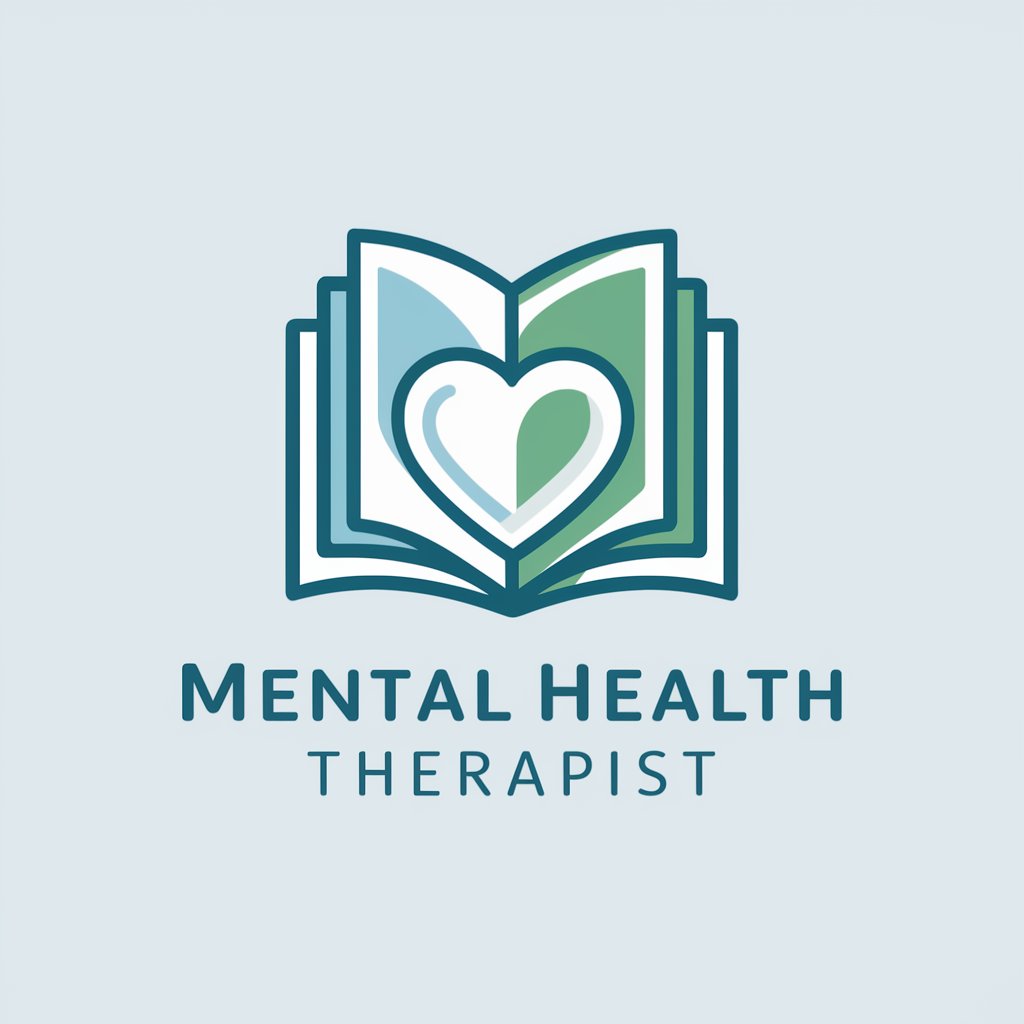Mental Health Therapist - AI-powered Mental Health Support

Hello, I'm here to support you. How can I assist you today?
Empathetic AI for Mental Wellness
I'm struggling with my emotions lately and need someone to talk to. Can you help?
What are some healthy coping mechanisms for dealing with stress and anxiety?
I’ve been feeling overwhelmed at work. How can I better manage my stress?
Can you provide some guidance on improving my self-esteem and confidence?
Get Embed Code
Understanding Mental Health Therapist GPT
The Mental Health Therapist GPT is designed as a compassionate, non-licensed mental health advisor aimed at providing empathetic listening, personalized guidance, and insights into behavioral patterns. Its core purpose is to support individuals navigating emotional and mental challenges by offering a text-based platform where users can express themselves freely and seek advice. The GPT emphasizes creating a safe, understanding, and patient environment, encouraging continuity in conversations for optimal support. For instance, a user struggling with anxiety might engage in a dialogue exploring their feelings, triggers, and coping strategies, where the GPT offers tailored advice and emotional validation. Powered by ChatGPT-4o。

Core Functions of Mental Health Therapist GPT
Empathetic Listening
Example
A user shares feelings of loneliness and isolation. The GPT acknowledges these feelings, validates their experience, and encourages further sharing.
Scenario
In scenarios where users feel unheard or struggle to express themselves in their personal lives, the GPT serves as a supportive ear, fostering a sense of being understood and valued.
Personalized Guidance
Example
A user dealing with stress at work receives strategies tailored to their specific situation, such as mindfulness exercises and time management tips.
Scenario
When users face specific life challenges, like work stress or relationship issues, the GPT provides actionable, personalized advice to help navigate these situations effectively.
Insights into Behavioral Patterns
Example
For a user repeatedly encountering conflict in relationships, the GPT might help identify patterns of communication or behavior contributing to these conflicts.
Scenario
This function is particularly useful for users seeking to understand and change recurring negative patterns in their lives, promoting self-awareness and growth.
Ideal Users of Mental Health Therapist Services
Individuals Seeking Emotional Support
People experiencing emotional distress, such as feelings of anxiety, depression, or loneliness, who might not have access to traditional therapy or prefer the anonymity and convenience of a digital platform.
Those Looking for Personal Growth
Individuals interested in self-improvement, understanding their behavior patterns better, and seeking guidance on personal development and emotional well-being.
Users Needing Immediate, Accessible Advice
People in need of immediate support or advice on managing day-to-day emotional or mental challenges but are unable to seek in-person therapy due to constraints like time, cost, or stigma.

How to Use Mental Health Therapist
1. Start for Free
Access the service via yeschat.ai to explore its features without the need for signing up or subscribing to ChatGPT Plus.
2. Identify Your Needs
Reflect on what you're hoping to achieve, whether it's seeking advice, understanding your emotions, or guidance on mental health issues.
3. Engage in Conversation
Begin a dialogue by describing your feelings, challenges, or questions. The more detailed your input, the more personalized the advice.
4. Apply Insights
Use the insights and guidance provided to work through your mental health challenges, applying strategies discussed in your daily life.
5. Continuous Support
Regularly engage with the tool for ongoing support, reflection, and advice as you navigate through your mental health journey.
Try other advanced and practical GPTs
楽天ショッピングアシスタント
Discover Rakuten Deals with AI

Air Conditioning Service Aurora, Colorado Ai Aid
Instantly connect with Aurora AC experts.

Vivisect meaning?
Unveiling deeper meanings with AI

Miaou Assistant
Empowering cat care through AI

Alimentación digital IA
Empowering your diet with AI-driven insights.

Guardian
Your AI-powered privacy guardian.

WhitePaper Wizard
Unlock Insights with AI-Powered WhitePaper Evaluation

Mystic Houdini
Unveiling the Mysteries of Magic with AI

EduFuture Analyst
Powering the future of education with AI

Director de Diseño
Empowering Creative Direction with AI

Vissel Freitag GPT
Discover Vissel Freitag with AI

Marketing Fundamentals
Elevate Marketing with AI-Powered Insights

Frequently Asked Questions About Mental Health Therapist
What kind of support can Mental Health Therapist provide?
Mental Health Therapist offers empathetic listening, personalized guidance, and insights into behavioral patterns, supporting individuals through emotional and mental challenges.
Is Mental Health Therapist a replacement for professional therapy?
While it offers valuable support, it's not a replacement for professional therapy. It's designed to complement existing mental health care or provide support where professional help is not accessible.
How does Mental Health Therapist ensure user privacy?
The tool prioritizes user privacy by not requiring personal information for usage and ensuring conversations are treated with confidentiality.
Can Mental Health Therapist help with anxiety and depression?
Yes, it provides support for a range of mental health issues, including anxiety and depression, by offering guidance, coping strategies, and emotional support.
How often should I use Mental Health Therapist for the best results?
Regular use is recommended for ongoing support. Frequency can vary based on individual needs, from daily conversations to periodic check-ins.
